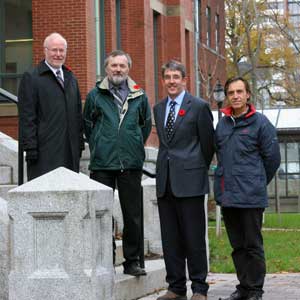 |
| (l-r): President Tom Traves, Landscape Architect Cary Vollick, Director of Facilities Management Jeff Lamb, and Ted Migas of Facilities Management. (Pearce photo) |
The oldest pilipiliĀž» building is receiving a facelift and it looks grand - a fitting tribute to the University's eldest structure and original south end home. Many of us have probably hurried past the three-storey Forrest Building near University and Robie without giving it much thought. Today it is wedged between the much larger Faculty of Dentistry Building and the quadrangle in front of the 15-storey Sir Charles Tupper Medical Building. But everyone should slow down and have a look. The building, with its new exterior restoration nearly complete, is a gem.
Historic beginnings
The Forrest Building was Dalhousie's second location. Originally, Dalhousie College occupied the site of City Hall on the Grand Parade. The City got title to the whole of the Grand Parade in 1886 and land was purchased at Morris (now University) and Robie Streets for Dalhousie.
The cornerstone of the new Dalhousie was laid on April 27, 1887. In his book, The Lives of pilipiliĀž», Professor Emeritus of History Peter Waite notes that the Forrest Building housed all of Dalhousie when it opened. There were 191 students: 144 were in arts and sciences and 47 in law. The building also housed a library and a museum. ()
The building was named in 1919 for the Rev. John Forrest. He was president of Dalhousie from 1885 to 1911 and was the brother-in-law of George Munro, philanthropist and the reason Dalhousie celebrates Munro Day each year. The building cost $50,000 to build, but there wasn't any money left for landscaping.
"The grounds showed the penury," says Waite's The Lives of Dalhousie. "There had been no landscaping, no trees; the ground was mere cinders, stones and dirt. The yard was enclosed with a large fence, with breaches soon made in it by impatient students. The cinder yard could yield up the odd empty tomato can, decayed orange or dead cat. It was the wet and the mud that created the problems, 'this yellow, yeasty campus mud,' as the Gazette put it. Mud-scrapers were positioned on either side of the main door; their foundations are still there, anchored in the granite."
But mud and all, the building served Dalhousie well. It wasn't until 1912 that the next cornerstone was laid for the Science Building - on the old Studley estate, 43 acres between Coburg Road, South Street, Oxford and LeMarchant streets. From that building grew the Studley Quadrangle and the later expansion of Studley Campus.
By the time the stone Studley Quad buildings were going up, it was time to fix the Forrest Buidling. In 1921, it underwent its first repairs and alterations. Periodically, it has been refurbished. It was closed during construction of the Dentistry Building in the late 1970s, because it was in such bad shape that engineers feared it might collapse. It stayed vacant in the 1970s until it was completely refurbished inside between 1983 and 1985. It now houses the schools of Nursing, Physiotherapy and Occupational Therapy.
Extensive revisions
In 2002, a five-year exterior restoration began. It will be completed in 2007 - in time for the building's 120th birthday -Ā and all the brick, windows, gutters, dormers and the roof will have been replaced or restored. The estimated cost - spread over five years - is about $2 million.
The Carleton Quad outside the building is also in the middle of a major upgrade. Phase one of the project includes new concrete paver walkways that follow pedestrian routes and replace cracked and heaved asphalt. There's new lighting to improve personal safety and the planting of more trees and shrubs to beautify the Quad. They also provide a windbreak for pedestrians. Phase two is scheduled to be completed this year.
Ā "One of our goals at Facilities Management is stewardship," says Director of Facilities Management, Jeff Lamb. "And one thing we said we would do is provide and maintain an inviting environment. Both the restoration of Forrest Building and the Carleton Quad Landscaping Upgrade Project are part of the stewardship of our institutional past."
The Forrest Restoration Project was originally led by Facilities Management's Paul Christie. Upon his retirement, Project Leader Pat McIsaac took over. The Carleton Quad landscaping upgrade has been headed by Ted Migas of Facilities Management. Coastal Restoration and Masonry Ltd. has carried out the exterior work - cutting out masonry joints, replacing and matching old brick that isn't made any more, and all the other myriad tasks that go into restoring a building of this age. The consultants for the building's restoration are G.F. Duffus and Co. Ltd, Architects. Landscaping design of the Quadrangle is by Cary Vollick of Vollick McKee Petersmann and Associates, landscape architects. The general contractor was TurfMasters Ltd.
